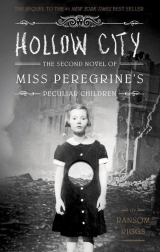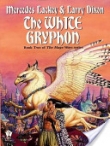
Текст книги "Hollow City"
Автор книги: Ransom Riggs
сообщить о нарушении
Текущая страница: 17 (всего у книги 21 страниц)

Emma crouched and called into the darkness. “Hello? Is anyone there?”
“If you’re coming,” returned a distant voice, “come quickly!”
Emma stood up, surprised. Then shouted: “Who are you?”
We waited for an answer. None came.
“What are we waiting for?” said Olive. “It’s Miss Wren!”
“We don’t know that,” said Millard. “We don’t know what happened here.”
“Well, I’m going to find out,” Olive said, and before anyone could stop her she’d gone to the cellar doors and leapt through them, floating gently to the bottom. “I’m still alive!” her voice taunted us from the dark.
And so we were shamed into following her, and climbed down the steps to find a passage tunneled through thick ice. Freezing water dripped from the ceiling and ran down the walls in a steady stream. And it wasn’t completely dark, after all—gauzy light glowed from around a turn in the passage ahead.
We heard footsteps approaching. A shadow climbed the wall in front of us. Then a cloaked figure appeared at the turn in the passage, silhouetted in the light.
“Hello, children,” the figure said. “I am Balenciaga Wren, and I’m so pleased you’re here.”

I am Balenciaga Wren
.
Hearing those words was like uncorking a bottle under pressure. First came the initial release—gasps, giddy laughter—and then an outpouring of joy: Emma and I jumped and hugged each other; Horace fell to his knees and tossed up his arms in a wordless hallelujah! Olive was so excited that she lifted into the air even with her weighted shoes on, stuttering, “We-we-we—we thought we might never—never see another ymbryne ever-ever again!”
This, finally, was Miss Wren. Days ago she’d been nothing more to us than the obscure ymbryne of a little-known loop, but since then she’d achieved mythic stature: she was, as far as we knew, the last free and whole-bodied ymbryne, a living symbol of hope, something we’d all been starving for. And here she was, right in front of us, so human and frail. I recognized her from Addison’s photo, only now there was no trace of black left in her silver hair. Deep-set worry lines stacked her brow and held her mouth in parentheses, and her shoulders were hunched as if she were not merely old, but straining under some monumental burden; the weight of all our desperate hope piling down on her.
The ymbryne pulled back the hood of her cloak and said, “I am very glad to meet you, too, dears, but you must come inside at once; it isn’t safe out here.”
She turned and hobbled away into the passage. We fell into line, waddling behind her through the tunneled ice like a train of ducklings after their mother, feet shuffling and arms held out in awkward balance poses to keep from slipping. Such was the power of an ymbryne over peculiar children: the very presence of one—even one we’d only just met—had an immediate pacifying effect on us.
The floor ramped upward, leading us past silent furnaces bearded with frost, into a large room clogged floor to ceiling and wall to wall with ice except for the tunnel we were in, which had been carved straight through the middle. The ice was thick but clear, and in some places I could see twenty or thirty feet into it with only a slight waver of distortion. The room appeared to be a reception area, with rows of straight-backed chairs facing a massive desk and some filing cabinets, all trapped inside tons of ice. Blue-filtered daylight shone from a row of unreachable windows, beyond which was the street, a smear of indistinct gray.
A hundred hollows could spend a week hacking at that ice and not reach us. If not for the tunnel entrance, this place would make a perfect fortress. Either that or a perfect prison.
On the walls hung dozens of clocks, their stilled hands pointed every which way. (To keep track of the time in different loops, maybe?) Above them, directional signs pointed the way to certain offices:
← UNDERSECRETARY OF TEMPORAL AFFAIRS
← CONSERVATOR OF GRAPHICAL RECORDS
NONSPECIFIC MATTERS OF URGENCY →
DEPT. OF OBFUSCATION AND DEFERMENT →
Through the door to the Temporal Affairs office, I saw a man trapped in the ice. He was frozen in a stooped posture, as if he’d been trying to dislodge his feet as ice overtook the rest of him. He’d been there a long time. I shuddered and looked away.
The tunnel came to an end at a fancy, balustraded staircase that was free of ice but awash in loose papers. A girl stood on one of the lower steps, and she watched our halting, slip-sliding approach without enthusiasm. She had long hair that was parted severely down the middle and fell all the way to her hips, small, round glasses she was constantly adjusting, and thin lips that looked like they’d never once curled into a smile.
“Althea!” Miss Wren said sharply. “You mustn’t wander off like that while the passage is open—anything at all might wander in here!”
“Yes, mistress,” the girl said, then cocked her head slightly.
“Who are they, mistress?”
“These are Miss Peregrine’s wards. The ones I was telling you about.”
“Have they brought any food with them? Or medicine? Or anything useful at all?” The girl spoke with excruciating slowness, her voice as wooden as her expression.
“No more questions until you’ve closed up,” Miss Wren said. “Quick now!”
“Yes, mistress,” the girl said, and with no apparent sense of urgency she ambled away down the tunnel, dragging her hands along the walls as she went.

“Apologies for that,” said Miss Wren. “Althea doesn’t mean to be obstinate; she’s just naturally mulish. But she keeps the wolves at bay, and we badly need her. We’ll wait here until she returns.”
Miss Wren sat on the bottom step, and as she lowered herself I could almost hear her old bones creaking. I didn’t know what she meant by keeps the wolves at bay, but there were too many other questions to be asked, so that one would have to wait.
“Miss Wren, how did you know who we are?” asked Emma. “We never said.”
“It’s an ymbryne’s business to know,” she replied. “I have watchers in the trees from here to the Irish Sea. And besides, you’re famous! There’s only one ymbryne whose wards were able to slip the corrupted’s grasp complete and entire, and that’s Miss Peregrine. But I’ve no idea how you made it this far without being captured—or how in peculiardom you found me!”
“A boy at the carnival directed us here,” said Enoch. He raised a hand level with his chin. “About yea big? Wearing a silly hat?”
“One of our lookouts,” said Miss Wren, nodding. “But how did you find him?”
“We caught one of your spy pigeons,” Emma said proudly, “and she led us to this loop.” (She left out the part about Miss Peregrine having killed it.)
“My pigeons!” Miss Wren exclaimed. “But how did you know about them? Much less catch one?”
Then Millard stepped forward. He had borrowed Horace’s disguising-room overcoat to keep from freezing, and though Miss Wren didn’t seem surprised to see a coat hovering in the air, she was astonished when the invisible boy wearing it said, “I deduced your birds’ location from the Tales of the Peculiar, but we first heard of them in your mountaintop menagerie, from a pretentious dog.”
“But no one knows the location of my menagerie!”
Miss Wren was now almost too astonished to speak, and since every answer we gave her only sparked more questions, we laid out our whole story for her, as quickly as we could, stretching all the way back to our escape from the island in those tiny, open boats.
“We nearly drowned!” said Olive.
“And got shot, and bombed, and eaten by hollows,” said Bronwyn.
“And run over by an underground train,” said Enoch.
“And squashed by a dresser,” said Horace, scowling at the telekinetic girl.
“We’ve traveled a long way across dangerous country,” Emma said, “all to find someone who could help Miss Peregrine. We were quite hoping that person would be you, Miss Wren.”
“Counting on it, really,” said Millard.
It took Miss Wren a few moments to find her voice, and when she did, it was gravelly with emotion. “You brave, wonderful children. You’re miracles, every one of you, and any ymbryne would be lucky to call you her wards.” She dabbed at a tear with the sleeve of her cloak. “I was so sorry to hear about what happened to your Miss Peregrine. I didn’t know her well, as I’m a retiring sort of person, but I promise you this: we’ll get her back. She and all our sisters!”
Get her back?
That’s when I realized Miss Peregrine was still hidden in the sack that Horace was carrying. Miss Wren hadn’t seen her yet!
Horace said, “Why, she’s right here!” and he put the sack down and untied it.
A moment later, Miss Peregrine came tottering out, dizzy after spending so long in the dark.
“By the Elderfolk!” Miss Wren exclaimed. “But … I heard she’d been taken by the wights!”
“She was taken,” Emma said, “and then we took her back!”
Miss Wren was so excited that she leapt up without her cane, and I had to steady her elbow to keep her from toppling over. “Alma, is that really you?” Miss Wren said breathlessly, and when she had her balance again she rushed over to scoop up Miss Peregrine. “Hullo, Alma? Is that you in there?”
“It’s her!” Emma said. “That’s Miss Peregrine!”
Miss Wren held the bird at arm’s length, turning her this way and that while Miss Peregrine squirmed. “Hum, hum, hum,” Miss Wren said under her breath, her eyes narrowing and lips drawing tight. “Something’s not right with your headmistress.”
“She got hurt,” said Olive. “Hurt on the inside.”
“She can’t turn human anymore,” said Emma.
Miss Wren nodded grimly, as if she’d already figured this out.
“How long’s it been?”
“Three days,” said Emma. “Ever since we stole her back from the wights.”
I said, “Your dog told us that if Miss Peregrine didn’t change back soon, she’d never be able to.”
“Yes,” Miss Wren said. “Addison was quite right about that.”
“He also said that the sort of help she needed was something only another ymbryne could give her,” said Emma.
“That’s right, too.”
“She’s changed,” said Bronwyn. “She isn’t herself anymore. We need the old Miss P back!”
“We can’t let this happen to her!” said Horace.
“So?” said Olive. “Can you turn her human now, please?”
We had surrounded Miss Wren and were pressing in on her, our desperation palpable.
Miss Wren put up her hands in a plea for quiet. “I wish it were that simple,” she said, “or so immediate. When an ymbryne remains a bird for too long, she becomes rigid, like a cold muscle. If you try and bend her back to shape too quickly, she’ll snap. She’s got to be massaged into her true form, delicately; worked and worked like clay. If I work with her through the night, I might have it done by morning.”
“If she has that long,” said Emma.
“Pray that she does,” said Miss Wren.
The long-haired girl returned, walking slowly toward us, dragging her hands along the tunnel walls. Everywhere they touched, layer upon layer of new ice formed. The tunnel behind her had already narrowed to just a few feet wide; soon it would be closed completely, and we’d be sealed in.
Miss Wren waved the girl over. “Althea! Run upstairs ahead of us and have the nurse prepare an examination room. I shall need all my medicinal remedies!”
“When you say remedies, do you mean your solutions, your infusions, or your suspensions?”
“All of them!” Miss Wren shouted. “And quickly—this is an emergency!”
Then I saw the girl notice Miss Peregrine, and her eyes widened a bit—the most I’d seen her react to anything—and she started up the stairs.
This time, she was running.
* * *
I held Miss Wren’s arm, steadying her as we climbed the stairs. The building had four stories, and we were heading for the top. Aside from the stairwell, that was the only part of the building still accessible; the other floors were all frozen shut, walls of ice clogging their rooms and hallways. We were, in effect, climbing through the hollowed center of a gigantic ice cube.
I glanced into some of the frozen rooms as we hurried past them. Bulging tongues of ice had broken doors off their hinges, and through their splintered jambs I could see evidence of a raid: kicked-over furniture, drawers torn open, snows of paper on the floor. A machine gun leaned against a desk, its owner frozen in flight. A peculiar slumped in a corner beneath a slash of bullet holes. Like the victims of Pompeii, arrested in ice rather than ash.
It was hard to believe one girl could have been responsible for all this. Apart from ymbrynes, Althea had to be one of the most powerful peculiars I’d ever met. I looked up in time to see her disappear around the landing above us, that endless mane of hair trailing behind her like a blurred afterimage.
I snapped an icicle off the wall. “She really did all this?” I said, turning it in my hand.
“She did indeed,” said Miss Wren, puffing beside me. “She is—or was, I should say—apprenticed to the minister of obfuscation and deferment, and was here performing her duties on the day the corrupted raided the building. At the time she knew little of her power other than that her hands radiated unnatural cold. To hear Althea tell it, her ability was the sort of thing that came in useful during hot summer days, but which she’d never thought of as a defense weapon until two hollows began devouring the minister before her very eyes. In mortal fear, she called upon a well of power previously unknown to her, froze the room—and the hollows—and then the entire building, all in the space of a few minutes.”
“Minutes!” Emma said. “I don’t believe it.”
“I rather wish I’d been here to witness it,” said Miss Wren, “though if I had, I likely would’ve been kidnapped along with the other ymbrynes who were present at the time—Miss Nightjar, Miss Finch, and Miss Crow.”
“Her ice didn’t stop the wights?” I asked.
“It stopped many of them,” said Miss Wren. “Several are still with us, I imagine, frozen in the building’s recesses. But despite their losses, the wights ultimately got what they came for. Before the entire building froze, they managed to secrete the ymbrynes out through the roof.” Miss Wren shook her head bitterly. “I swear on my life, one day I’ll personally escort all those that hurt my sisters to Hell.”
“All that power she has didn’t do any good at all, then,” said Enoch.
“Althea wasn’t able to save the ymbrynes,” Miss Wren said, “but she made this place, and that’s blessing enough. Without it we’d have no refuge anywhere. I’ve been using it as our base of operations for the past few days, bringing back survivors from raided loops as I come across them. This is our fortress, the only safe place for peculiars in all of London.”
“And what of your efforts, madam?” said Millard. “The dog said you came here to help your sisters. Have you had any luck?”
“No,” she said quietly. “My efforts have not been successful.”
“Maybe Jacob can help you, Miss Wren,” Olive said. “He’s very special.”
Miss Wren looked sideways at me. “Is that so? And what is your talent, young man?”
“I can see hollows,” I said, a little embarrassed. “And sense them.”
“And kill them, sometimes,” added Bronwyn. “If we hadn’t found you, Miss Wren, Jacob was going to help us slip past the hollows that guard the punishment loops, so that we could rescue one of the ymbrynes being held there. In fact, maybe he could help you …”
“That’s kind of you,” said Miss Wren, “but my sisters are not being held in the punishment loops, or anywhere near London, I’m sure.”
“They aren’t?” I said.
“No, and they never were. That business about the punishment loops was a ruse concocted to ensnare those ymbrynes whom the corrupted weren’t able to capture in their raids. Namely, myself. And it nearly worked. Like a fool, I flew right into their trap—the punishment loops are prisons, after all! I’m lucky to have escaped with only a few scars to show for it.”
“Then where were the kidnapped ymbrynes taken?” asked Emma.
“I wouldn’t tell you even if I knew, because it’s none of your concern,” Miss Wren said. “It isn’t the duty of peculiar children to worry for the welfare of ymbrynes—it’s ours to worry for yours.”
“But, Miss Wren, that’s hardly fair,” Millard began, but she cut him short with a curt “I won’t hear anything else about it!” and that was that.
I was shocked by this sudden dismissal, especially considering that if we hadn’t worried about Miss Peregrine’s welfare—and risked our lives to bring her here!—she would’ve been condemned to spend the rest of her days trapped in the body of a bird. So it did seem like our duty to worry, since the ymbrynes had clearly not done a good enough job worrying to keep their loops from being raided. I didn’t like being talked down to that way, and judging from Emma’s knitted brow, she didn’t, either—but to have said so would’ve been unthinkably rude, so we finished our climb in awkward silence.
We came to the top of the stairs. Only a few of the doorways on this level were iced over. Miss Wren took Miss Peregrine from Horace and said, “Come on, Alma, let’s see what can be done for you.”
Althea appeared in an open door, her face flushed, chest heaving. “Your room’s all ready, mistress. Everything you asked for.”
“Good, good,” said Miss Wren.
“If we can do anything to help you,” Bronwyn said, “anything at all …”
“All I need is time and quiet,” Miss Wren replied. “I’ll save your ymbryne, young ones. On my life I will.” And she turned and took Miss Peregrine into the room with Althea.
Not knowing what else to do with ourselves, we drifted after her and congregated around the door, which had been left open a crack. We took turns peeking inside. In a cozy room dimly lit by oil lamps, Miss Wren sat in a rocking chair holding Miss Peregrine in her lap. Althea stood mixing vials of liquid at a lab table. Every so often she’d lift a vial and swirl it, then walk to Miss Peregrine and pass it under her beak—much the way smelling salts are waved under the nose of someone who’s fainted. All the while, Miss Wren rocked in the chair and stroked Miss Peregrine’s feathers, singing her a soft, lilting lullaby:
“Eft kaa vangan soorken, eft ka vangan soorken, malaaya …”
“That’s the tongue of the old peculiars,” Millard whispered.
“Come home, come home … remember your true self … something like that.”
Miss Wren heard him and looked up, then waved us away. Althea crossed the room and shut the door.
“Well, then,” said Enoch. “I can see we’re not wanted here.”
After three days of the headmistress depending on us for everything, we had suddenly become extraneous. Though we were grateful to Miss Wren, she’d made us all feel a bit like children who’d been ordered to bed.
“Miss Wren knows her business,” came a Russian-accented voice from behind us. “Best leave her to it.”
We turned to see the stick-thin folding man from the carnival, standing with his bony arms crossed.
“You!” said Emma.
“We meet again,” the folding man said, his voice deep as an ocean trench. “My name is Sergei Andropov, and I am captain of peculiar resistance army. Come, I will show you around.”
* * *
“I knew he was peculiar!” Olive said.
“No, you didn’t,” said Enoch. “You only thought he was.”
“I knew you were peculiar the second I saw you,” said the folding man. “How you weren’t captured long time ago?”
“Because we’re wily,” said Hugh.
“He means lucky,” I said.
“But mostly just hungry,” said Enoch. “Got any food around here? I could eat an emu-raffe.”
At the mere mention of food, my stomach growled like a wild animal. None of us had eaten since our train ride to London, which seemed eons ago.
“Of course,” said the folding man. “This way.”
We followed him down the hall.
“So tell me about this peculiar army of yours,” Emma said.
“We will crush the wights and take back what’s ours. Punish them for kidnapping our ymbrynes.” He opened a door off the hallway and led us through a wrecked office where people lay sleeping on the floor and under desks. As we stepped around them, I recognized a few of their faces from the carnival: the plain-looking boy, the frizzy-haired snake-charmer girl.
“They’re all peculiar?” I asked.
The folding man nodded. “Rescued from other loops,” he said, holding a door open for us.
“And you?” said Millard. “Where did you come from?”
The folding man led us into a vestibule where we could talk without disturbing the sleepers, a room dominated by two large wooden doors emblazoned with dozens of bird insignias. “I come from land of frozen desert beyond Icy Waste,” he said. “Hundred years ago, when hollows first born, they strike my home first. Everything destroy. All in village killed. Old woman. Baby. All.” He made a chopping motion in the air with his hand. “I hide in butter churn, breathe through reed of straw, while own brother killed in same house. After, I come to London to escape the hollows. But they come, too.”
“That’s awful,” said Bronwyn. “I’m so sorry for you.”
“One day we take revenge,” he said, his face darkening.
“You mentioned that,” said Enoch. “How many are in your army, then?”
“Right now six,” he said, gesturing to the room we’d just left.
“Six people?!” said Emma. “You mean … them?”
I didn’t know whether to laugh or cry.
“With you, makes seventeen. We growing quick.”
“Whoa, whoa, whoa,” I said. “We didn’t come here to join any army.”
He gave me a look that could freeze Hell, then turned and threw open the double doors.
We followed him into a large room dominated by a massive oval table, its wood polished to a mirror shine. “This is Ymbryne Council meeting place,” the folding man said.
All around us were portraits of famous old peculiars, not framed but drawn directly onto the walls in oil and charcoal and grease pencil. The one closest to me was a face with wide, staring eyes and an open mouth, inside of which was a real, functioning water fountain. Around its mouth was a motto written in Dutch, which Millard, standing next to me, translated: “From the mouths of our elders comes a fountain of wisdom.”
Nearby was another, this one in Latin. “Ardet nec consomitur,” Melina said. “Burned but not destroyed.”
“How fitting,” said Enoch.
“I can’t believe I’m really here,” said Melina. “I’ve studied this place and dreamed about it for so many years.”
“It’s just a room,” said Enoch.
“Maybe to you. To me, it’s the heart of the whole peculiar world.”








